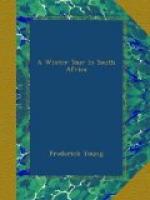The Kafirs, who are employed in great numbers, and who are earning high wages at their various occupations, are always to be seen, either working hard, or, after the hours of labour are over, amusing themselves cheerfully, chatting at street corners, walking, gossiping, and talking, and gratifying themselves by giving vent to their very voluble tongues. Here also, as at Johannesburg, at Potchefstroom, and at Klerksdorp, I was forcibly struck with the large amount of English spoken, as well as of the number of English names over the various shops in the Transvaal towns. This is an interesting and important fact, which marks the tendency of the direction of future development. The country must certainly become more and more anglicised, in spite of the political efforts made to oppose it.
[Illustration: Decorative]
[Illustration: Decorative]
WATERBURG.
I left Pretoria on July the 17th in a wagon with eight horses, accompanied by two friends, for an excursion into the Waterburg district of the Transvaal. On this occasion we travelled about one hundred and fifty miles north of Pretoria in the course of a fortnight, returning about the same distance back again. We had a half-breed servant named Sole with us, who made himself generally useful during our journey. All this time we camped out day and night, sleeping always in the open veldt, in true gipsy fashion.
We went by the Van der Vroom Poort, having the Maalieburg range of mountains on our left.
Our first night was spent at a farm called “Polonia,” belonging to a Russian Missionary who has been for many years in the Transvaal. He unites the pursuits of spiritual instruction according to the tenets of the Greek Church, with farming on a large scale. On leaving “Polonia” we passed the large and picturesque German Mission Station of “Hebron,” which is situated in the midst of a rich and fertile valley. One night we outspanned at a spot called the “Salt Pans.” While breakfast was being prepared the next morning, I walked to see those wonderful “Salt Pans,” which were close to our camping ground. I descended by a steep path some six hundred or seven hundred feet to the bottom. It is an immense amphitheatre at the base of thickly wooded hills. It is larger in extent than the vast open excavation formed by the “Kimberley” Mine at Kimberley. The salt and soda brine is perpetually oosing from the bottom, and is continually being scraped up with a sort of wooden scraper into heaps, where, after a time, by the action of the atmosphere, it becomes crystallised. I picked up and brought away with me several crystals of pure salt. This is another of the marvels of the Transvaal, a country which abounds in natural wealth of all kinds, fitted for the service of man. These Salt Pans are the property of the Transvaal Government, which derives a considerable income from the tax imposed for taking away the salt, and soda, from them.




